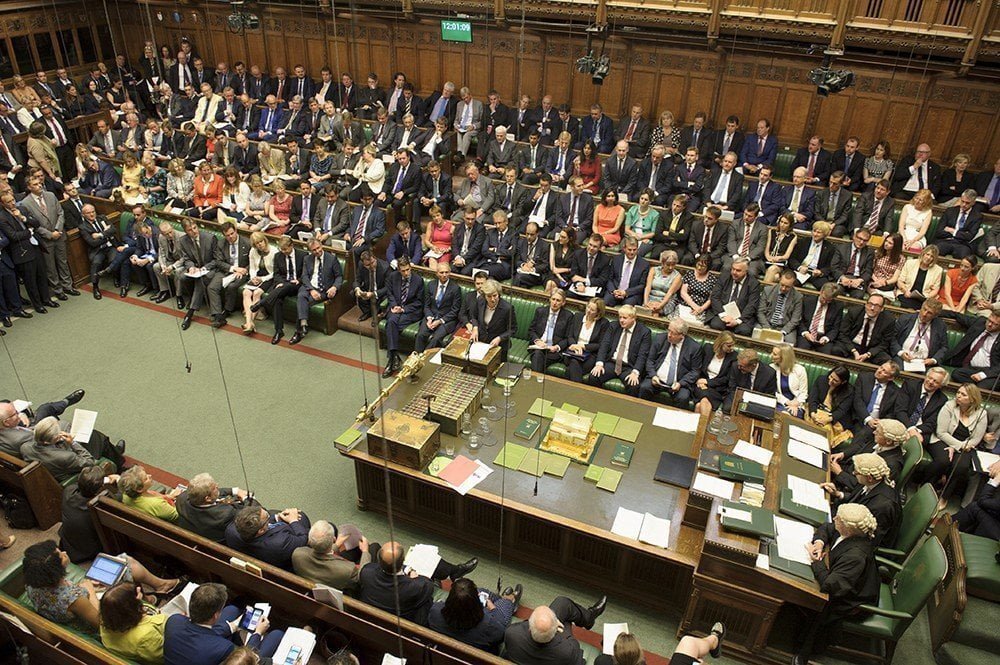|
(Via Wales Civil Society Forum) Wales Forum on Brexit NEWSLETTER / Fforwm Cymru ar Brexit CYLCHLYTHYR Mawrth 29 / March 29
The Forum is hosting an informal Brexit roundtable discussion between third sector organisations in Wales and the sector national membership councils, NCVO, SCVO, WCVA and NICVA on 4 April from 2pm to 4:30pm. The session is open to all organisations, so if you would like to join us then please register here.
|

Felly – Beth sydd wedi digwydd wythnos yma….hyd yma?
Ddydd Llun, pleidleisiodd ASau ar gynnig y Llywodraeth ar gyfer y Camau Nesaf ac yn y pen draw fe wnaethant gymryd rheolaeth dros amserlen Senedd San Steffan ar gyfer dydd Mercher. Arweiniodd hyn at y ‘Pleidleisiau Dangosol’ a oedd yn cynnig sawl opsiwn i ASau, er mwyn gweld ble y gallai cyfaddawd fod yn bosib.
Roedd llawer o gwestiynau ynglŷn â’r broses hon. I gael adolygiad manwl o’r rhain i gyd, gweler y papur briffio hwn gan Hansard Society: Indicative Votes: Options, voting methods and voting systems.
Yn y diwedd, pleidleisiodd ASau ar 8 opsiwn gwahanol ac, yn ddryslyd braidd, roedd rhai ohonynt yn ymwneud â’r berthynas â’r UE yn y dyfodol – megis ceisio am undeb tollau parhaol – tra oedd eraill yn ymwneud yn fwy â phroses, megis defnyddio refferendwm cadarnhau ar unrhyw gytundeb Brexit sy’n cael ei basio yn Nhŷ’r Cyffredin
Gwrthododd ASau bob opsiwn. Dyma oedd perygl y system ie/na a ddewiswyd ac fel y dengys yn y Blog hwn – roedd disgwyl y canlyniad hwn.
Serch hynny, yn groes i rai honiadau yn y cyfryngau, nid oedd y broses yn ddibwrpas, roedd yn gam mewn proses a fwriadwyd i ddarganfod a oedd cydsyniad yn bosib ac, os felly, ymhle.
- Fel y dywedodd yr Institute for Government (IfG) yn huawdl iawn, mae’r pleidleisiau yn ffordd weithdrefnol o ddatrys problem wleidyddol.
- Fodd bynnag, os yw’r diffyg cydsyniad yn parhau, fel yr eglurir yn y dadansoddiad hwn o’r canlyniadau gan IfG, mae ‘Brexit damweiniol heb gytundeb’ yn parhau’n bosibilrwydd pendant.
- Byddai angen deddfwriaeth benodol i wrthdroi’r canlyniad awtomatig, sef Brexit heb gytundeb, fel yr eglurir yn y blog hwn gan yr Athro Mark Elliot.
So – What has happened this week….so far?
On Monday MP’s voted on the Government’s Next Steps motion and ultimately took control of the Parliamentary timetable for Wednesday. This lead to the ‘Indicative Votes’ which offered MPs a menu of options, in order to see where compromise might be possible.
There were many questions surrounding this process. For an in depth review of all of these, see this Hansard Society Briefing: Indicative Votes: Options, voting methods and voting systems.
MPs ended up voting on 8 different options some of which confusingly related to the future relationship with the EU – like pursuing a permanent customs union, while others related more to process, like using a confirmatory referendum on any Brexit deal passed in the Commons.
Ultimately MPs rejected all options. This was a risk of the yes/no system selected and as shown by this Blog –was an expected outcome.
However contrary to some media claims, the process was not senseless, it was a step in a process intended to determine if and where consensus might emerge.
- As the Institute for Government (IfG) eloquently puts it, the votes are a procedural fix for a political problem.
- However, if the lack of consensus continues, as explained in this IfG analysis of the results, an ‘accidental no-deal Brexit’ remains a distinct possibility.
It would require specific legislation to reverse the default no-deal outcome, as explained in this blog by Professor Mark Elliot

Beth sy’n digwydd heddiw ac wythnos nesaf?
Fel i ni sôn yn y cylchlythyr diwethaf, mae’r UE wedi caniatáu estyniad ac iddo ddwy haen. Fel y mae pethau ar hyn o bryd, mae’r DU yn gweithio tuag at ddau ddyddiad cau:
- I sicrhau’r dyddiad cau hwyrach – 22 Mai, rhaid i’r DU basio’r Cytundeb Ymadael erbyn heddiw (29 Mawrth).
- Fel arall, y dyddiad cau yw 12 Ebrill (yn realistig 10-11 Ebrill) ac erbyn y dyddiad hwnnw rhaid i’r DU benderfynu a fydd yn cymryd rhan yn etholiadau Aelodau o Senedd Ewrop ai peidio.
Mae ASau felly newydd bleidleisio ar y Cytundeb Ymadael am y 3ydd tro, ac wedi’i wrthod o 58 pleidlais.
Beth am benderfyniad Bercow i atal yr un bleidlais eto?
I egluro hyn, mae’n werth cofio bod dwy ran i becyn y ‘Cytundeb Ymadael’:
- Y Cytundeb Ymadael ei hun, sef y rhan sy’n rhoi strwythur i’r ymadawiad o’r UE ac yn ymdrin â’r ffin yn Iwerddon, hawliau dinasyddion, y cyfnod pontio…
- A Datganiad Gwleidyddol ar y berthynas yn y dyfodol
Roedd y ddwy Bleidlais Ystyrlon gyntaf yn trin y rhain fel un pecyn. Mae Llywodraeth y DU wedi penderfynu rhannu’r bleidlais ar y dogfennau hyn i fodloni amod Bercow fod yn rhaid i bleidlais arall fod yn un wahanol.
Heddiw – pleidleisiodd Tŷ’r Cyffredin ar y rhan gyntaf, sydd wedi arwain at y term Pleidlais Ystyrlon 2.5. Yn hanfodol, hyd yn oed pe bai’r bleidlais heddiw wedi cymeradwyo’r Cytundeb Ymadael, byddai Brexit heb gytundeb yn DAL yn bosib, oherwydd yn gyfreithiol rhaid i’r cytundeb A’R datganiad gwleidyddol gael eu cymeradwyo. Prif ddiben heddiw felly oedd datgloi’r estyniad tan 22ain Mai.
I fynd yn ddyfnach i oblygiadau cyfreithiol y gwahaniad hwn, gweler y blog yma.
Beth nesaf wedyn?
- Gan fod Theresa May wedi colli’r bleidlais eto y dyddiad Brexit newydd yw 12 Ebrill.
- Serch hynny, bydd disgwyl i’r DU amlinellu ei bwriadau erbyn 10 Ebrill pan fydd yr UE yn cynnal Uwchgynhadledd Frys
- Ddydd Llun 1 Ebrill, mae disgwyl i ASau gynnal Pleidleisiau Dangosol 2.0, i geisio mireinio’r opsiynau ymhellach.
Mae popeth yn dal yn bosib ond y farn yw bod y bleidlais heddiw yn cynyddu’r tebygolrwydd o estyniad hir ac etholiad cyffredinol. Gweler yr amserlen Brexit / Etholiad hon gan IfG i gael rhagor o wybodaeth.
What’s happening today and next week?
As we explored in the last newsletter, the EU has granted a two-tier extension. As things currently stand the UK is working to two deadlines:
- To have the longer deadline – 22 May, the UK must pass the withdrawal Agreement by today (29 March).
- Otherwise the deadline is 12 April (realistically the 10-11 April) by which time the UK must decide whether to take part in the MEP elections.
MP’s have therefore just voted on, and rejected by 58 votes, the Withdrawal Agreement for a 3rd time.
What about Bercow’s decision to block the same vote again?
To explain this, it is useful to remember that the ‘Withdrawal Agreement’ package has 2 texts:
- The Withdrawal Agreement itself, the part which structures the exit from the EU and covers the Irish border, citizens’ rights, a transition period…
- And a Political Declaration on the future relationship.
The first two Meaningful Votes treated these as one package. The UK Government has decided to split voting on these documents to meet Bercow’s condition of a substantially different vote.
Today – the Commons voted on the first of these two, which has led to the term Meaningful Vote 2.5. Crucially, even had the vote today approved the Withdrawal Agreement, a no-deal Brexit would STLL be on the table, because legally both it AND the political declaration must be approved for ratification. Today’s exercise was therefore mainly intended to unlock the May 22nd extension.
For a deeper read on the legal implications of this separation, see this blog.
What next then?
- As Theresa May lost the vote again the new Brexit deadline is 12 April.
- However the UK will be expected to outline its intentions by 10 April when an Emergency EU Summit will take place.
- On Monday 1 April MP’s are expected to do Indicative Votes 2.0, to try and further whittle down the options.
Everything is still on the table though the result of the vote today is understood as increasing the likelihood of a long extension and general election. See this IfG Brexit / Election timeline for more information

Rhagor o wybodaeth a dyddiadau:
Mae WCVA ar y cyd â Llywodraeth Cymru wedi comisiynu Resources for Change i ymchwilio i effaith Brexit ar wasanaethau trydydd sector anstatudol yng Nghymru a darganfod beth sydd angen ei wneud i’w cefnogi. Maent yn edrych yn benodol ar yr effaith ar y canlynol:
- Argaeledd gwasanaethau
- Hyfywedd ariannol mudiadau
- Gweithlu’r mudiadau hyn
Mae’r tîm yn awyddus i weithio gyda chynifer o fudiadau trydydd sector â phosib i greu tystiolaeth empirig i lenwi bwlch mawr yng nghyd-destun Cymru. Os hoffech gymryd rhan, cysylltwch ag Irene Evison drwy ebostio: irene@r4c.org.uk
Roedd diwrnod Brexit i fod heddiw felly ymddengys yn addas bod gennym ddau adolygiad mawr o’r ddwy flynedd diwethaf:
- UK in a Changing EU: Article 50 – Two Years On.
- The Institute for Government: The Brexit Effect – How Government has Changed since the EU Referendum, sy’n ystyried, ymysg pethau eraill, sut mae Brexit wedi herio a newid Datganoli.
- Gweler hefyd yr araith ddiweddar hon gan Mike Russell i gael gwybod mwy am Brexit a Datganoli.
Eisiau diweddariad ar Brexit a Masnach? Gweler y cyfweliad diweddar hwn â Dr Ludivine Petitin o Brifysgol Caerdydd.
Angen eglurhad cryno o rai o opsiynau’r Pleidleisiau Dangosol? Gweler y tabl hwn.
 diddordeb mewn Brexit a’r Amgylchedd? Mae Llywodraeth Cymru wedi lansio Ymgynghoriad ar Egwyddorion a Threfniadau Llywodraethu Amgylcheddol. Gweler yr adolygiad hwn gan yr Athro Richard Cowell. Mae’r erthygl academaidd hon a gyhoeddwyd yn Environmental Politics hefyd yn cynnig adolygiad diweddar a chynhwysfawr o effaith Brexit ar bolisi amgylcheddol y DU a’r UE.
Angen gwybodaeth ynglŷn ag Effaith Brexit ar y Gweithlu Gofal Cymdeithasol a Gofal Plant yng Nghymru? Gweler yr ymchwil yma gan Ipso Mori a gomisiynwyd gan Lywodraeth Cymru sy’n dod i’r casgliad y gallai Brexit waethygu’r heriau sydd eisoes yn bodoli yn y sector.
More information and dates:
WCVA in conjunction with the Welsh Government have commissioned Resources for Change to undertake research into the impact of Brexit on non-statutory third sector services in Wales and to determine what needs to be done to support them. They are looking specifically at the impact on:
- The availability of services
- The financial viability of organisations
- The workforce of these organisations
The team are keen to engage with as many third sector organisations as possible to produce empirical evidence to fill what is a significant gap in the Welsh context. If you would like to take part, please contact: Irene Evison at: irene@r4c.org.uk
Today was going to be Brexit day so it seems fitting that we have two major reviews of the last two years:
- UK in a Changing EU: Article 50 – Two Years On.
- The Institute for Government: The Brexit Effect – How Government has Changed since the EU Referendum, which explores amongst other topics, how Brexit has challenged and changed Devolution.
- See also this recent speech by Mike Russell for more on Brexit and Devolution.
Want an update on Brexit and Trade? see this recent Interview with Dr Ludivine Petitin of Cardiff University.
Need a summary explanation of some of the Indicative Vote options? See this table.
Interested in Brexit and the Environment? The Welsh Government’s Consultation on Environmental Principles and Governance has been launched. See this review by Professor Richard Cowell. This academic article published in Environmental Politics also offers a recent and comprehensive review of the impact of Brexit on UK and EU environmental policy.
Need information on the Impact of Brexit on the Social care and Childcare workforce in Wales? See this research by Ipso Mori commissioned by the Welsh Government which concludes that Brexit has the potential to exacerbate existing challenges facing the sector.


